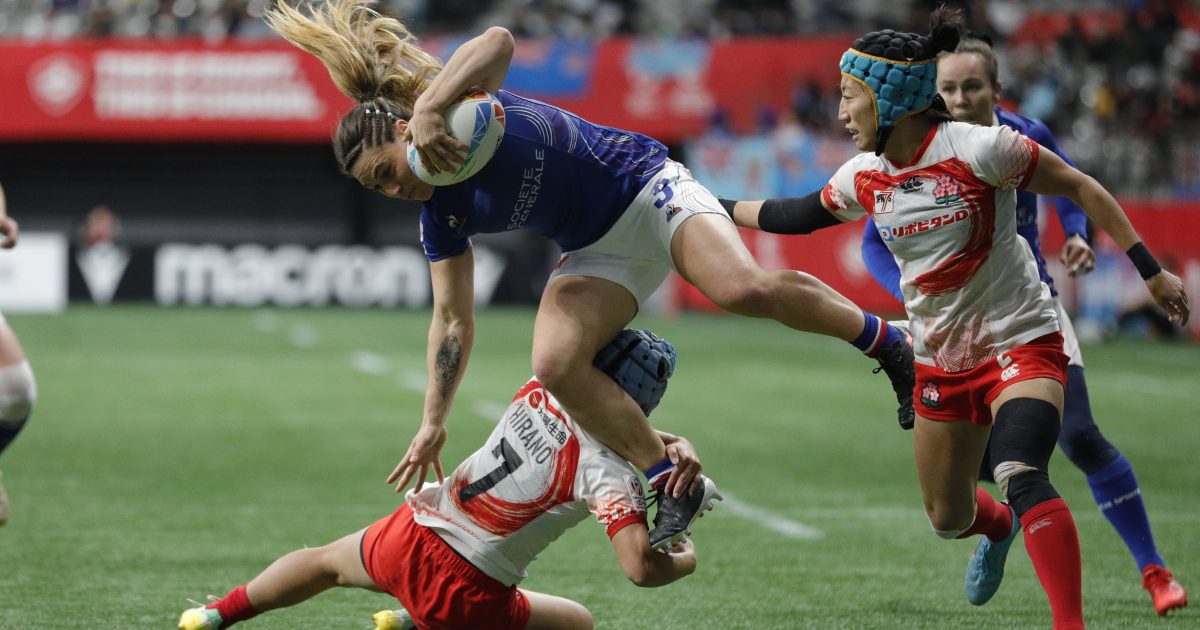Les Françaises de retour aux USA

Back in USA. Ces dernières années, le circuit féminin avait zappé l’étape américaine. La dernière fois, c’était à Glendale en 2020. Avant cela, il y avait eu Las Vegas, Atlanta puis Houston. Los Angeles, cinquième étape du circuit du 1er au 3 mars, est la cinquième ville américaine visitée par la caravane du Sevens.
Jamais encore les Françaises n’ont fait mieux que la 4e place aux Etats-Unis (c’était leur classement les deux dernières fois). Les filles de David Courteix vont désormais viser le Top 3 pour la première fois pour garder la pression sur l’Australie (leader du classement) et la Nouvelle-Zélande (2e).
Un 100% en poule
Fortes de leur médaille d’argent à Vancouver – Caramba, encore une et toujours pas d’or ! – les Françaises ont réduit l’écart avec l’Australie à dix points et ne sont pas près de s’arrêter. Elles ont disputé plus de finales de Cup cette saison (Le Cap et Vancouver) que dans toutes les précédentes saisons du circuit. Mais jamais encore elles n’ont enchaîné deux finales de suite (Perth était un accident de parcours).
Alors la France va tout faire pour casser le cycle elle qui, avec la Nouvelle-Zélande, est la seule équipe qui n’a perdu aucun match de poule cette saison. Elle est la troisième équipe à avoir inscrit le plus d’essais depuis le début (90), soit 20% de plus que lors des quatre premières étapes de la saison dernière.
La stat est la même en retour. La France est la troisième équipe à avoir encaissé le moins d’essais (46).
Principales armes : le renvoi rapide (31% des essais), les offloads (en moyenne 7,2 par match, mais un record de 43 à Vancouver en un week-end !), les courses avec ballon (24,7 en moyenne par match). Son point noir : toujours la discipline (huit cartons, 3,9 pénalités par match et jusqu’à 28 à Vancouver, le pire bilan de toutes les équipes cette saison).
Match retour contre l’Australie
Dans la poule B, ce sera le premier match des Françaises contre le Japon depuis Hongkong la saison dernière. Les Bleues avaient remporté cinq de leurs six duels avec un écart de 22 points en moyenne.
Ensuite, ce sera leur première rencontre face à l’Irlande puis Toulouse 2023 ; souvenir cuisant puisqu’elles s’étaient inclinées 27-7 chez elles en phase de poule. Depuis Langford 2022, la France a du mal à se lancer face à l’Irlande, étant menée à la pause dans chacune de ses sept dernières rencontres (trois victoires). Pas de quoi s’inquiéter pour autant : la France a remporté ses quatre derniers matchs contre les Irlandaises aux USA.
Enfin, le match très attendu sera contre l’Australie, leader des Series, 40e du nom sur le circuit mondial. Victorieuse en demi-finale à Vancouver (21-19), la France tentera de décrocher une deuxième victoire de rang contre les Aussies pour la première fois.
Les joueuses à suivre
Ce tournoi sera une étape importante pour Chloé Pelle puisque ce sera le 50e de sa carrière. Déjà. La joueuse de 34 ans qui a commencé à Amsterdam en 2013 a pour l’instant disputé 49 tournois, marqué 69 essais et n’a manqué que sept tournois seulement.
Caroline Drouin a été la meilleure plaqueuse du tournoi de Vancouver le week-end précédent avec 19 plaquages, soit le troisième rendement le plus important depuis le début de la saison, derrière les 23 plaquages de Madison Ashby à Cape Town et les 20 d’Emma Uren à Perth.
Les joueuses de France 7 féminine pour le HSBC SVNS Los Angeles
- Séraphine Okemba – 25 tournois
- Anne-Cécile Ciofani – 18 tournois
- Chloé Pelle – 49 tournois
- Lou Noël – 16 tournois
- Joanna Grisez – 20 tournois
- Yolaine Yengo – 19 tournois
- Valentine Lothoz – 16 tournois
- Camille Grassineau – 44 tournois
- Carla Neisen – 31 tournois
- Caroline Drouin – 23 tournois
- Jade Ulutule – 23 tournois
- Lili Dezou – 11 tournois
- Ian Jason – 17 tournois
Matchs de France 7 féminine
Vendredi 1er mars :
- France – Japon à 16h52 (heure de Los Angeles) – 1h52 samedi 2 mars (heure de Paris)
Samedi 2 mars :
- France – Irlande à 12h04 (heure de Los Angeles) – 21h04 (heure de Paris)
- France – Australie à 16h40 (heure de Los Angeles) – 1h40 dimanche 3 mars (heure de Paris)





















































